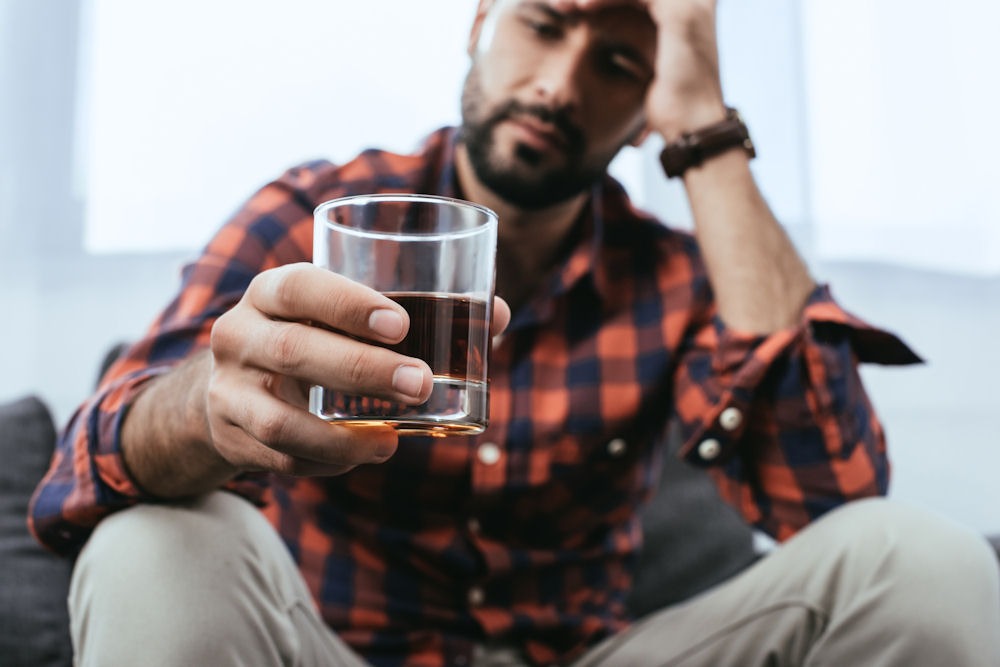The answer to this question runs deeper than a simple blanket response, especially when leg pain is coupled with body aches after drinking. There are in fact many answers. All of these depend on individual health and bodily reactions tied to unhealthy alcohol consumption. Help your doctor narrow down your symptoms and coinciding treatment by equipping yourself with the following information.
What Causes Body Aches After Drinking?
Body aches and leg pain can be connected through many of the same symptoms. However, general muscle and body aches after drinking are caused by a variety of the following factors:

Generally speaking, alcohol negatively affects muscle tissue and causes muscle loss with prolonged consumption. These effects are felt more by some than others. Correlatively, muscular responses and reactions are different for everyone. Therefore, having pains and body aches after drinking can indicate your muscles are more sensitive to these alcoholic toxins than others. Or worse, it can be an indication of an underlying muscular health issue.
Proteins are necessary to maintain and improve muscle mass as well as other vital functions. Alcohol consumption inhibits the production of these vital proteins, affecting joints, muscles, and tissues throughout the body, causing body aches. With prolonged use, protein deficiency can be a permanent health problem that requires medication-assisted supplements to aid protein recovery.
Alcohol soaks up all of the water content in your body in conjunction with being a known diuretic. Couple that with the fact that most drinkers rarely have sufficient water intake, and you have a double-edged sword. When your muscles and organs aren’t getting the water supplements necessary to function, these regions of the body will experience cramps, soreness, and aching. This is your body’s way of telling you it needs more water and less alcohol.
As the body breaks down and metabolizes alcohol, its toxins can cause pain throughout the body. These pains can occur in the stomach, arms, legs, or anywhere in the body. Alcoholic toxin-related ache locations vary per individual and depend on individual factors such as medical history, underlying health conditions, and addiction severity.
It is common for the toxins in alcohol to induce an inflammatory response in the body, especially in the legs. Alcohol in itself is an agitator of the muscular and central nervous system. If one’s body does not react well to drinking, it can trigger inflammation in any part of the body. This inflammation, depending on where it occurs in the body, can produce apparent red spots, burning sensations, and aches, especially in the legs. Please note, that if the inflammation is deep or concealed enough, skin rashes and redness may not be visible.
Alcohol consumption can accelerate your heart rate, while simultaneously lowering blood pressure. This is an unhealthy combination that induces poor circulation commonly felt in the legs. Individuals experiencing poor leg circulation as a result of drinking will feel leg aches, pains, numbness, or cramps. This can also be accompanied by a condition known as restless leg syndrome or RLS for short. These short-term circulation problems can mutate into long-term problems like blood clots or other health issues with prolonged drinking habits.
Alcohol soaks up a lot of the nutrients your body needs to maintain healthy circulatory and muscle functions. Many of these functions intertwine in the legs, causing leg pain in the presence of these nutritional deficiencies. This also can cause difficulty standing or shaky legs depending on severity. If you’re experiencing anywhere from minor to severe leg pain after drinking, it’s a strong indication that you should stop drinking and consult a physician immediately.
Your body can only break down so much alcohol before it is expunged from the body. With your metabolism working overtime, especially with prolonged use, the aid of lactic acids can become overstimulated. These acids cause muscle soreness, especially throughout the legs, accelerating the process of tearing down your muscles. This, in turn, causes extended muscle fatigue and low energy levels that make walking even more difficult.
Electrolytes such as potassium and sodium are vital fuel to keep your leg muscles ripe and ready. Alcohol suppresses these vital chemicals, causing leg fatigue, cramps, and aches throughout. This often occurs in conjunction with limited water intake which accelerates electrolyte deficiencies and leg soreness. Cessation from drinking, combined with adequate water intake in most cases is enough to reverse these deficiencies and restore normal electrolyte levels.
Leg pain and liver damage are frequently synonymous with one another. This means any lingering leg pain can often be an indication of some form of liver damage. This is especially the case with leg fatigue, aches, and soreness. Liver damage occurs because alcohol puts excessive strain on liver functions as it struggles to keep up with alcohol intake. Once it has processed all it can process, it sends the rest to the kidneys. Your kidneys can only take so much before permanent liver damage is caused, which coincides with kidney-related leg pain. This is why experiencing any sort of leg pain in coordination with a drinking problem should be met with swift action.

How Does Alcohol Impact the Central Nervous System?
While alcohol is a major hindrance to vital organs, little is talked about regarding its severe impact on short-term and long-term nervous system complications. Here are just a few of its negative effects on the central nervous system.
Yes, insulin is produced predominantly in the pancreas. However, it is a hormone that directly affects neurotransmitter stimulation and release of vital central nervous system functions. This means alcohol blocks insulin receptors in the brain, resulting in central nervous system misfires. For example, insulin suppression caused by alcohol trickles down into neurotransmitter suppressions, affecting focus, cognitive functions, and pain regulators. If these insulin deficiencies are bad enough, they can lead to serious diabetes conditions that require daily insulin shots.
The body considers alcohol a foreign agent or toxin to the body. When digested, it slows cognitive response and reactions due to the broken nerve cell communication. Put simply, alcohol not only makes you slur your words incommunicable, but it also renders your cells incapable of communicating with one another. As a CNS depressant, alcohol permanently damages the central nervous system over time, causing irreversible conditions such as Parkinson’s disease.
The central nervous system plays a key role in cravings for addiction sufferers. When an addicted individual stops drinking, the central nervous system sends false signals across the body that it ‘needs’ a dose of the substance. These CNS cravings trigger uncomfortable and painful withdrawal symptoms. This is your central nervous system begging for another drink. Rest assured, our men’s residential program has just the help you need to overcome these early short-term withdrawal symptoms.
How Spero Recovery’s 12-Step Process Resolves Alcohol Addiction and Improves Health?
Spero Recovery’s thorough 12-step immersive program is no ordinary 12-step process. Our life-changing approach helps your body heal from addiction and improve overall health simultaneously in the following ways.
Spero Recovery’s number one priority is twofold: your good health and sobriety. Both of these go hand-in-hand with having full access to all the recovery measures at your disposal. This means giving you complete and total access to every tool you desire and need when you need it. You’ll never feel there is a shortage of recovery options, help, or support in any of our immersive 12-step recovery programs.
Spero Recovery ensures your connections are surrounded by our caring team and patients who make up a collective family unit. As a closely connected community, we encourage, boost, and support one another in a family-friendly environment that works together for each other’s sobriety. With support being the most important recovery asset, our support team gives you the confidence to rise above recovery challenges.
Spero for men’s recovery model involves a focus on enjoying the rehab journey. We believe rehab should be a fun, exciting, and memorable experience for everybody involved. That’s why we provide a wide variety of enjoyable activities and hobbies to occupy your time. While fun is a focus, this focus is methodical because the primary key to addiction recovery is addiction habit replacement. It’s not just fun for the sake of fun. It’s about helping you replace your drinking habit with a daily hobby or activity.
Spero Recovery is proudly sponsored by Alcoholics Anonymous and their revolutionary 12-step process that equips us with a certified top-notch 12-step specialist. That means you have direct access to a certified professional to talk you through whatever battles you are facing. We take pride in our thorough 12-step model because we are dedicated to your sobriety even after you’ve completed treatment. This approach is truly the secret to achieving long-term sobriety.
Spero Recovery is Here to Help
Don’t ignore the tell-tale signs of leg pain and body aches after drinking that indicate a serious drinking problem. It’s never too late to get the help you need and we are eager to be your guide, and tool to help you fix your drinking problem. Reach out to us now before your drink-induced physical ailments become a permanent serious health problem. We will help you enjoy the journey to a happier and healthier you.









